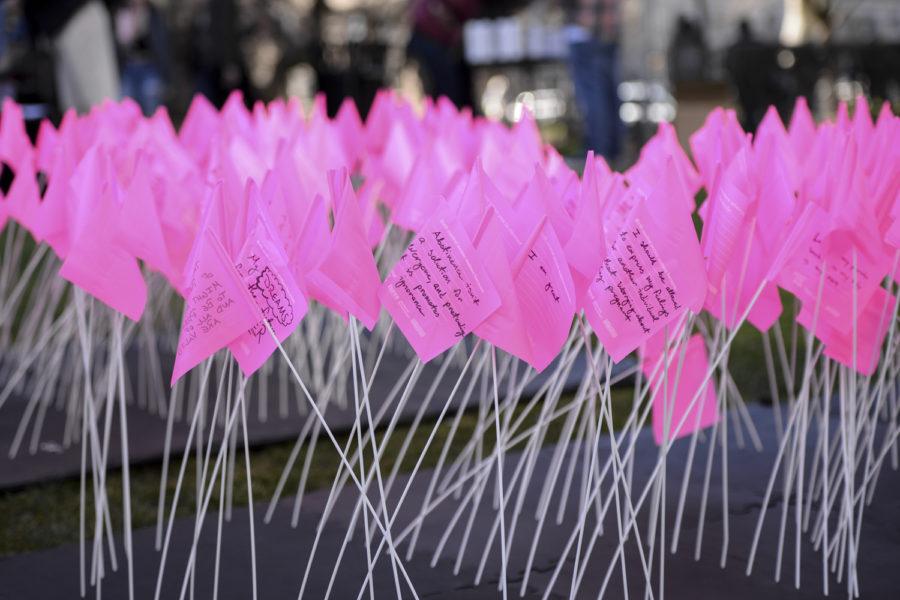Bright pink flags dot the lawn outside the William Pitt Union on one of the first warm days of spring semester as students kneel to read the stories written on each individual marker — sometimes pausing to add their own to the display.
Emphasizing the importance and intersection of topics such as birth control access, rape culture and bodily autonomy on Pitt’s campus, the installation sparked conversation between students, faculty and staff about reproductive rights. The Pitt Planned Parenthood Club displayed the exhibit — titled “My Body is My Own” — on the William Pitt Union lawn from noon to 5 p.m. Tuesday.
Dighan Kelly — a sophomore urban studies and French double major — serves as co-president of the Pitt Planned Parenthood Club along with senior political science major Mac Cunningham. Spearheading the project organization, Kelly and her co-workers helped make the installation possible.
“If anything, I want students to know they are not alone and their experiences are valid and there is an entire student body organizing behind them,” Kelly said. “Especially for the students on campus who are victims of sexual assault and harassment.”
The exhibit consisted of a multitude of flags, carefully laid out to spell out the words “My Body is My Own.” Written on each flag in black ink, participants responded to prompts asking them to celebrate empowering body choices, reflect on a time when they reclaimed their body or write why access to birth control matters.
“I think this is very cool as a whole exhibit because you don’t have individuals’ names,” Cunningham said. “They’re anonymous and personal, and some of them are pretty raw.”
Kelly specifically mentioned one flag, where a person wrote that they empowered themself by wearing the dress they were raped in two years earlier.
Serving as an advocacy group for Pitt’s Student Health Service, the the Planned Parenthood Club started before Kelly and Cunningham enrolled at Pitt. The club works in collaboration with both the national Planned Parenthood organization — which funded the installation — and the local Planned Parenthood of Western Pennsylvania chapter.
Though the club has maintained a fairly low-profile presence on campus in recent years, the co-presidents said they have worked hard to re-establish a voice on campus. This effort began with a petition for better access to birth control for students and faculty on campus, which they launched in the fall.
The club drafted a petition — which they intend to present to Chancellor Patrick Gallagher — asking Pitt to affirm it will continue to provide birth control to students and employees. The petition was created in October to ensure that Pitt does not follow schools such as Notre Dame, which ended birth control coverage for students and faculty after the Trump administration weakened the Affordable Care Act’s birth control mandate. Notre Dame, a Catholic university, reversed the decision five days later.
The club received more than 300 signatures in the first few hours and has since exceeded its short-term goal of 500 signatures — now aiming for 1,000. Both co-presidents talked of wanting to broker a meeting with the Chancellor.
“I’d love to sit down with school administration and share thoughts about it,” Kelly said. “I’d love to be able to combine our thought processes and see real change on campus.”
Kelly commented on how the group’s campus involvement gained momentum following instances of gender-based violence on campus, including the death of Alina Sheykhet and the Ms. magazine article regarding sexual assault and harassment allegations within Pitt’s communication department.
“[The chancellor] has been very open obviously in the past. After the election he sent an email, with DACA, with state funding,” Cunningham said. “I don’t see why this couldn’t be another.”
Kelly first got involved with Planned Parenthood with her feminist student union at Taylor Allderdice High School. She was even bussed to Washington, D.C., for the Whole Woman’s Health v. Hellerstedt Supreme Court case — which deemed a bill in the Texas legislature unconstitutional for imposing an undue burden on women seeking a legal abortion. Meanwhile, Cunningham started by volunteering at the clinic Downtown, where he now works as their organizing intern.
“[I thought] I need to do something besides sit at home and feel like I am complicit about what the administration is doing,” Cunningham said.
Aside from students, other organizations and chapter affiliates were also present at the installation. This included Kenneth Gonzalez, a three-month employee and longtime supporter of Planned Parenthood. He works directly with the Planned Parenthood Action Fund and Generation Action sectors, which team up campus groups such as Pitt’s Planned Parenthood Club to improve social action for reproductive rights.
“[The installation] sparks a conversation without it feeling too intimidating,” Gonzalez said. “It provides a more accessible way of doing some introspective thinking.”
Gonzalez also worked as a liason for the relationship with FORCE: Upsetting Rape Culture, another national organization the works on issues such as sexual assault. The group NextGen also had representatives there, offering voter registration forms to students.
“People are changing the space with their hands and then registering to vote or updating their registration,” Kelly said. “So now they are going to change America’s space with their hands by going to a ballot box.”
The interactive experience on the William Pitt Union lawn was temporary — its pieces were recycled following its display. According to Cunningham, these projects, small or large, can “raise hell” — especially on college campuses where student groups demand political action.
“Art is meant to be a medium where you’re able to express yourself, not always through words,” Cunningham said. “When you have this collection of stories put together, it really amplifies all of the voices than if you just had one person standing.”



